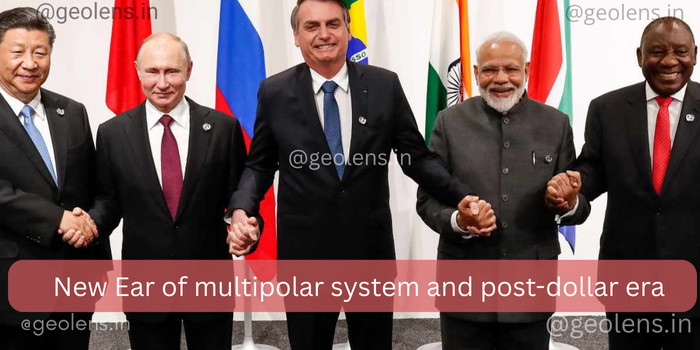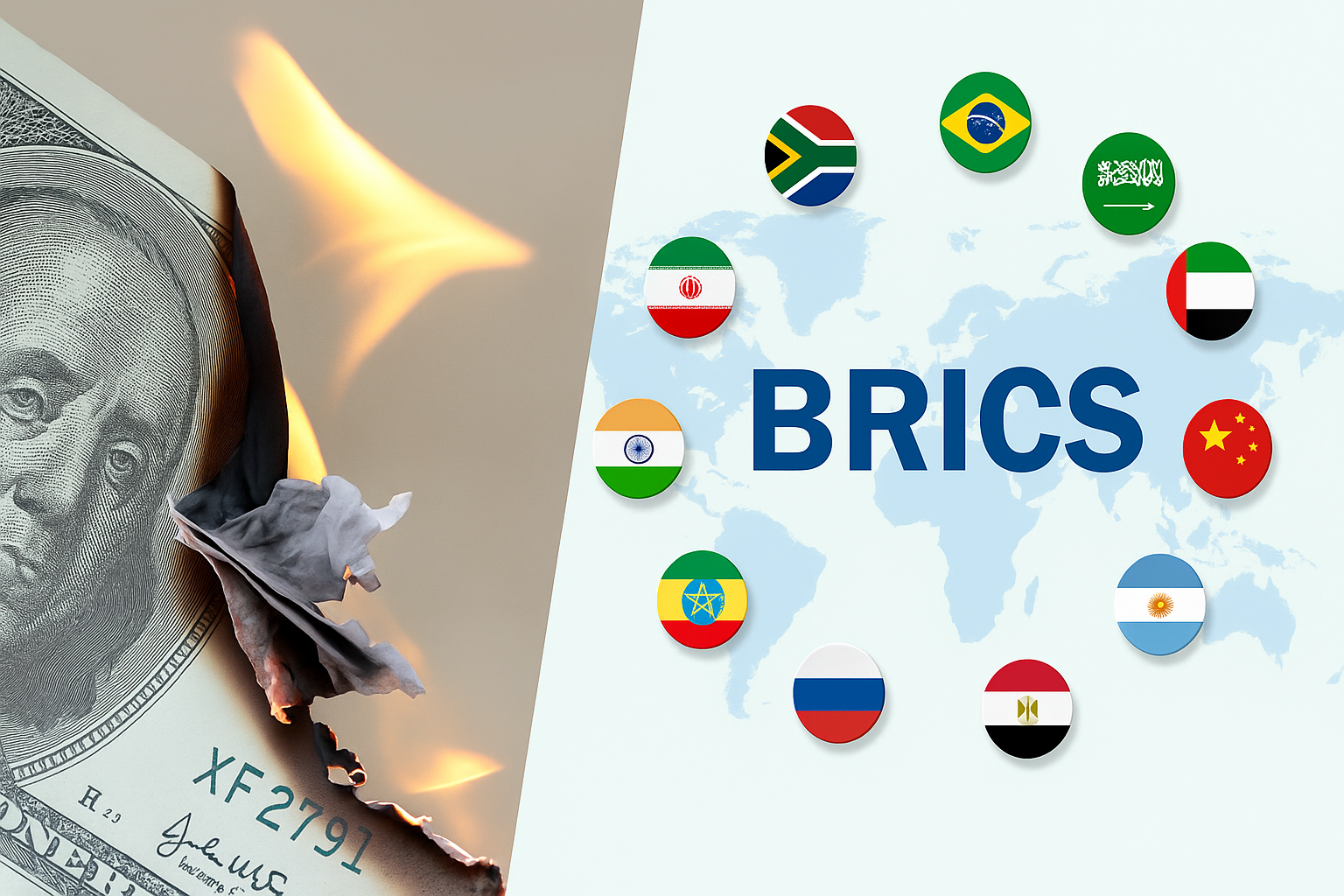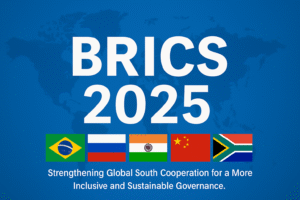Synopsis:
Phrase of De-dollarization: For decades, the U.S. dollar has been the unrivaled king of global finance. It has dominated international trade, served as the primary reserve for central banks, and acted as the benchmark for vital commodities like oil and gold. But now, that supremacy is being challenged. Around the world, the conversation is shifting toward De-dollarization and the rise of a potential BRICS currency, two forces that could redefine the future of the global economy.
Table of Contents
American trend forecaster Gerald Celente recently warned that the era of U.S. dollar dominance is nearing its end. His observation reflects a growing reality: countries are seeking greater economic independence, while blocs like BRICS—Brazil, Russia, India, China, and South Africa—are increasingly pushing back against Washington’s financial power. Together, these trends are laying the foundation for a multipolar currency world.
'Only 2% of India's GDP comes from trade with the US. That's it'
— KarmaYogi (@karma2moksha) August 7, 2025
Gerald Celente - American business consultant told RT’s Rick Sanchez that India is becoming more self-sufficient and refuses to kowtow to US demands.
Trump would need better advisors now pic.twitter.com/E3amsgfTjb
The Push for De-dollarization
The term De-dollarization is no longer just an academic concept; it is a practical policy being pursued by major economies. It refers to countries reducing their reliance on the U.S. dollar by settling trade in alternative currencies. China, Russia, Iran, and other BRICS members are spearheading this effort. For example, Moscow and Beijing have ramped up their trade in rubles and yuan, deliberately cutting out the dollar.
This matters because global demand for the dollar has long been tied to its role in trade. If nations settle oil, technology, or commodity deals in currencies other than the greenback, the world needs fewer dollars to function. Over time, this trend chips away at America’s financial influence.

Geopolitical Backlash and Alternative Systems
Washington’s reliance on sanctions has accelerated De-dollarization. By weaponizing the dollar to punish countries like Iran, Venezuela, and Russia, the U.S. has unintentionally motivated those nations to build parallel financial systems. Sanctions fatigue has now spread beyond America’s traditional rivals, pushing more countries to diversify away from the dollar.
Russia and China are leading this parallel system-building, while other nations quietly follow suit. As a result, a growing number of economies are no longer comfortable being overly exposed to U.S. financial decisions. Instead, they are preparing for a world where trade and investment can continue without being hostage to the dollar.
The Rise of a BRICS Currency
Alongside De-dollarization, the idea of a BRICS currency is gaining momentum. Representing over 40% of the global population and a significant share of world GDP, the BRICS bloc has the scale to challenge Western financial dominance.
Although a common BRICS currency is still in the discussion phase, its potential impact is huge. If BRICS nations adopt a shared medium of exchange for oil, commodities, and technology, the dollar’s grip on global trade would loosen dramatically. Even the mere debate about such a currency signals that countries are ready to reimagine financial systems outside of U.S. control.
Also read about the recent BRICS Summit 2025
Consequences for the United States
If De-dollarization and the creation of a BRICS currency continue to gather pace, the consequences for the U.S. will be significant. A weaker dollar would make imports costlier, fueling inflation. Reduced demand for U.S. Treasury bonds would force Washington to borrow at higher interest rates. More fundamentally, the U.S. risks losing what has long been called its “exorbitant privilege”—the ability to finance deficits, wars, and stimulus packages without facing immediate economic repercussions.
What Experts Are Saying
American analysts argue that the decline of the dollar is not hypothetical but already underway. They caution that overreliance on sanctions and deficit-driven policies are accelerating the shift toward De-dollarization. Without meaningful changes in strategy, the U.S. risks undermining its own economic stability as more countries consider alternatives like a BRICS currency.
India’s Role in De-dollarization
India is playing a careful but significant role in this transformation. While not aggressively anti-dollar, India has taken measured steps to reduce dependence on the greenback. The Reserve Bank of India (RBI) has encouraged rupee-based trade, especially with countries like Russia and Iran, and diversified its foreign exchange reserves.
This approach not only strengthens India’s financial independence but also aligns it with the larger Global South movement to democratize international finance. In this emerging landscape, India could act as both a bridge and a beneficiary of a world less dominated by the dollar.
Why It Matters to You
The debate around De-dollarization and the BRICS currency isn’t just for policymakers or economists. Its effects ripple down to ordinary people. If the dollar weakens, international travel and imported goods may become more expensive. Investors could increasingly look toward gold, cryptocurrencies, or other non-dollar assets for stability. And nations like India must adapt to a multipolar system where trade occurs in a variety of currencies.
Author’s Viewpoint / Synopsis
From my perspective, the phase of de-dollarization marks a turning point in modern economic history. For decades, the U.S. dollar wasn’t just a currency; it was a symbol of financial control and political leverage.
Today, that monopoly is being challenged—not in theory, but in practice—by nations that no longer want to be tied down by Washington’s policies or vulnerable to U.S. sanctions.
What stands out most is the pragmatism behind this shift. Countries like China, Russia, and even India aren’t rejecting the dollar out of ideology alone—they are diversifying to protect their own economies. It is less about tearing down the old system and more about building resilience in a world where dependency on a single currency feels increasingly risky.
India, especially, is in a unique position. By cautiously promoting rupee trade and aligning with the Global South’s call for financial fairness, it can gain influence without completely alienating the West.
This balanced approach could allow India to benefit from both worlds: stability through its ties with the U.S. and strategic autonomy through closer cooperation with BRICS.
To conclude, I believe we are entering a post-dollar era—not one where the greenback disappears overnight, but one where it becomes just one of several competing currencies. For policymakers, this demands foresight; for investors, it requires diversification; and for ordinary citizens, it is a reminder that global finance is no longer business as usual.
People Also Ask (PAA) on De-Dollarization and BRICS Currency
Q1: Which countries are leading de-dollarization?
China, Russia, and Iran are at the forefront of de-dollarization. BRICS nations—Brazil, Russia, India, China, and South Africa—are also actively exploring alternatives to the dollar in trade.
Q2: Can the BRICS currency replace the U.S. dollar?
It is unlikely to completely replace the U.S. dollar soon, but a BRICS currency could significantly reduce dollar dominance in global trade and finance if adopted widely.
Q3: How will de-dollarization affect global trade?
Global trade may become more multipolar, with settlements happening in local currencies like the yuan, ruble, and rupee. This reduces U.S. influence over international transactions.
Q4: Why is gold important in de-dollarization?
Many central banks are increasing gold reserves as a hedge against dollar dependence. Gold is seen as a stable, non-political asset in times of currency shifts.
Q5: What are the risks of de-dollarization for the U.S.?
The U.S. could face inflation, higher borrowing costs, and the loss of its “exorbitant privilege” of unlimited dollar printing without immediate economic backlash.
Q6: How does India benefit from de-dollarization?
India benefits by promoting rupee trade, reducing exposure to dollar volatility, and strengthening ties with the Global South. It also gains more strategic autonomy in trade.
Q7: Will the U.S. dollar collapse because of de-dollarization?
A complete collapse is unlikely, but the dollar’s share in global reserves and trade may gradually decline, making it one of several strong currencies rather than the undisputed leader.
Conclusion: The Future Beyond the Dollar
The U.S. dollar is unlikely to vanish overnight, but its era of unquestioned supremacy is fading. The dual forces of De-dollarization and the push for a BRICS currency are steadily reshaping the global financial order. For the United States, this presents serious challenges that demand strategic adaptation. For countries like India, it opens opportunities to assert greater financial sovereignty. And for individuals, it is a reminder that global finance is entering a new chapter—one where multiple currencies share power rather than a single dollar dictating the rules.
FAQs on De-Dollarization and BRICS Currency
- What does de-dollarization mean?
De-dollarization refers to the process of countries reducing their reliance on the U.S. dollar for international trade, investments, and reserves. Instead, they use local currencies or alternative global currencies to conduct transactions. - Why is de-dollarization happening now?
De-dollarization is accelerating because of U.S. sanctions, growing geopolitical tensions, and the desire of emerging economies to reduce dependency on the dollar. Countries like China, Russia, and India want more financial independence. - How does de-dollarization affect the U.S. economy?
If fewer countries use the dollar, demand for U.S. Treasury bonds could fall, forcing the U.S. to borrow at higher interest rates. Imports may also become more expensive, fueling inflation in the U.S. - What role do sanctions play in de-dollarization?
The U.S. often uses the dollar as a weapon through economic sanctions. Nations like Russia, Iran, and Venezuela have been cut off from the dollar system, which has pushed them to seek alternative financial networks. - What is the BRICS currency idea?
BRICS countries (Brazil, Russia, India, China, and South Africa) are exploring the possibility of creating a common currency for trade. This currency could reduce dependency on the dollar and make global trade more multipolar. - Is a BRICS currency already in use?
No, the BRICS currency is still under discussion. However, member countries have already started using their national currencies—like the Chinese yuan, Russian ruble, and Indian rupee—for bilateral trade. - How could de-dollarization impact ordinary people?
For regular people, a weaker dollar could make imports, foreign travel, and overseas education more expensive. At the same time, investors may look to gold, cryptocurrencies, and other assets as safer alternatives. - What is India’s position on de-dollarization?
India is cautious but supportive of reducing overdependence on the dollar. It has promoted rupee-based trade, especially with countries like Russia and Iran, while still maintaining strong ties with Western financial systems. - Will the U.S. dollar lose its global reserve status completely?
It’s unlikely that the U.S. dollar will disappear as the world’s main reserve currency anytime soon. However, its dominance will likely weaken as more countries diversify into gold, yuan, euro, and possibly a BRICS currency. - Why should ordinary investors care about de-dollarization?
De-dollarization affects global markets, currencies, and commodity prices. For investors, this means diversifying portfolios beyond dollar-based assets—such as adding gold, emerging market bonds, or even digital assets—to protect against volatility.
The real question now is not whether De-dollarization and a BRICS currency will shape the future, but how quickly and deeply this transition will transform the global economy.
Pratik Kondawale Tweet

Pratik Kondawale
Strategist | Indian Defence & Global Affairs
Founder of GeoLens.in, Pratik writes in-depth analysis on India’s defence strategy, military tech, and global power shifts delivering sharp insights through an Indian lens.


5 thoughts on “BRICS Currency and De-dollarization: The Beginning of a New Global Financial Era 2025”